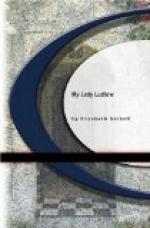All this time I have wandered from Mr. Gray. Of course, we first saw him in church when he read himself in. He was very red-faced, the kind of redness which goes with light hair and a blushing complexion; he looked slight and short, and his bright light frizzy hair had hardly a dash of powder in it. I remember my lady making this observation, and sighing over it; for, though since the famine in seventeen hundred and ninety-nine and eighteen hundred there had been a tax on hair-powder, yet it was reckoned very revolutionary and Jacobin not to wear a good deal of it. My lady hardly liked the opinions of any man who wore his own hair; but this she would say was rather a prejudice: only in her youth none but the mob had gone wigless, and she could not get over the association of wigs with birth and breeding; a man’s own hair with that class of people who had formed the rioters in seventeen hundred and eighty, when Lord George Gordon had been one of the bugbears of my lady’s life. Her husband and his brothers, she told us, had been put into breeches, and had their heads shaved on their seventh birthday, each of them; a handsome little wig of the newest fashion forming the old Lady Ludlow’s invariable birthday present to her sons as they each arrived at that age; and afterwards, to the day of their death, they never saw their own hair. To be without powder, as some underbred people were talking of being now, was in fact to insult the proprieties of life, by being undressed. It was English sans-culottism. But Mr. Gray did wear a little powder, enough to save him in my lady’s good opinion; but not enough to make her approve of him decidedly.




